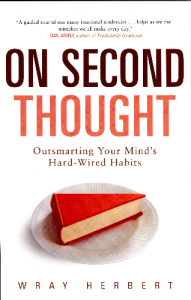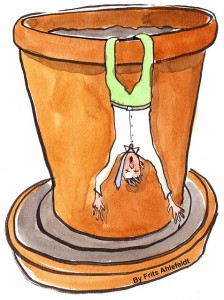Have you ever said to yourself “What was I thinking?” You realize that you ignored all the red flags at the beginning when you went for the job interview and took the job or you have somehow forgotten that you have tried that route before and now you are here in a similar setting that did not work before. We sometimes do not do the analysis before we agree to a situation or have come to some faulty assumptions that we wonder how we could be so confused and make a poor decision.
Faulty thinking is one of hazards that we, in our humanness are prone, to. What I am meaning is that simply going by our intuition can send us down the wrong track. An article title d the “Pitfalls of Doing What Comes Naturally” by Diane Cole (2011) in the Psychotherapy Networker provides a counter to the “extraordinary influence wielded by the intuitive mind” in current thinking (p. 1). The author references Blink: The Power of Thinking without Thinking by Malcolm Gladwell as a popular work that suggests the decision making power of the intuition is stronger than rational and logical reasoning.
d the “Pitfalls of Doing What Comes Naturally” by Diane Cole (2011) in the Psychotherapy Networker provides a counter to the “extraordinary influence wielded by the intuitive mind” in current thinking (p. 1). The author references Blink: The Power of Thinking without Thinking by Malcolm Gladwell as a popular work that suggests the decision making power of the intuition is stronger than rational and logical reasoning.
Cole (2011) suggests that the cognitive research cited in The Invisible Gorilla by Chabri and Simons (2010) and On Second Thought by Herbert (2010) provide counter arguments to the “overly positive” view of using intuition as a guide. Their take on cognitive psychology is that our intuition is sometimes helpful and sometimes not. What we remember intuitively largely from our unconscious is influenced by heuristics, “hard-wired mental –shortcuts and cognitive “rules of thumb” that we use in our daily decision-making. The study of heuristics is on the forefront of cognitive research today.
Coasting along on autopilot making decisions, the authors suggest, can cause serious errors in judgment. In this case the information we remember and use for our decision-making sometimes can be considered a “heuristic distortion”. The article suggests that because our mind simplifies and categorizes information it produces these distortions. The premise of the article is that this sometimes erroneous automatic process must be over-ridden by more conscious processes. We need to “tune-in and decipher our brain chatter” (p. 2). What we remember and attend to gets simplified and categorized into schemas or mental maps and they need to be reprogrammed according to the author. Continue reading →
*The views expressed by our authors are personal opinions and do not necessarily reflect the views of the CCPA




